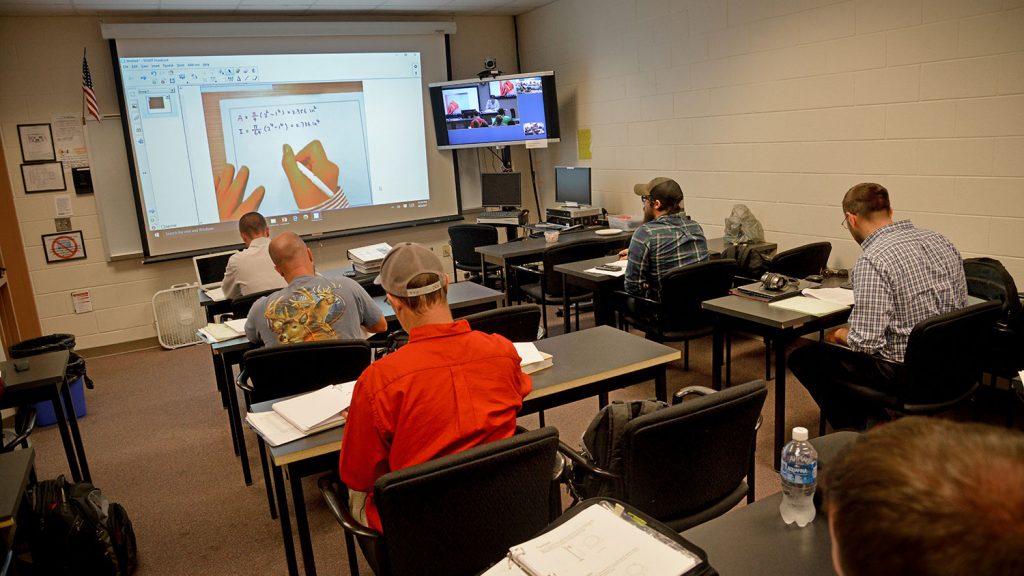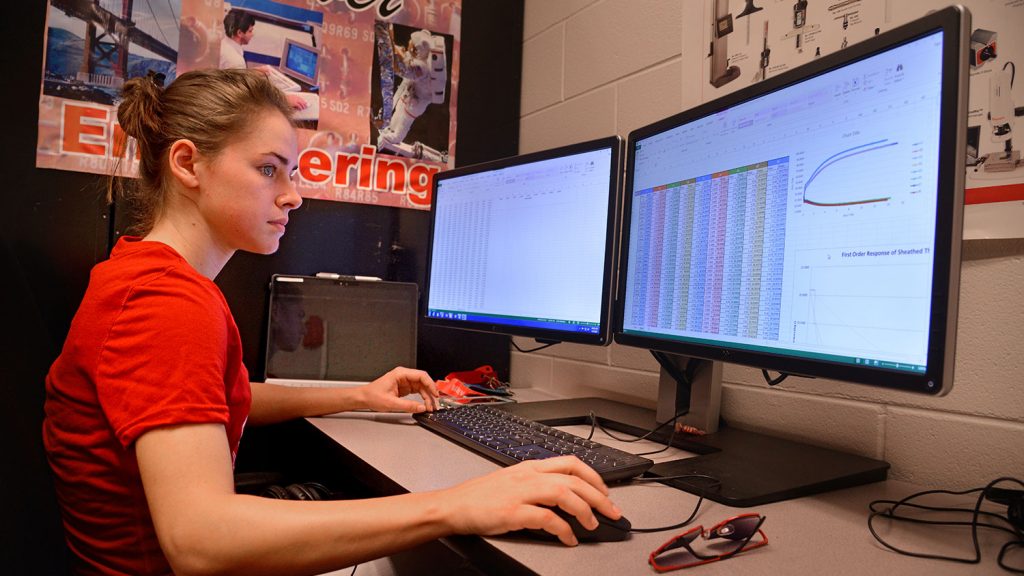Programs
Mechanical Engineering Systems Bachelor of Science in Engineering Program
The NC State Mechanical Engineering Systems (MES) Bachelor of Science in Engineering (B.S.E.) Program is a site-based, transfer program located on the CCC campus in Havelock, North Carolina. Students in the MES Program earn a B.S.E. with a concentration in mechanical engineering systems.

Mechanical engineering courses, taught by nationally recognized mechanical and aerospace engineering faculty at NC State, are delivered live from the Raleigh campus via HD interactive video conferencing. MES students attend the same engineering lectures as Raleigh-based students.
Local NC State faculty at CCC teach the systems engineering content, conduct all laboratory experiences and direct students in the two-semester capstone design experience. MES students enjoy extensive interaction with their local professors, small class sizes and develop close-knit groups with their local peers.
Hands-on laboratory exercises allow students to explore and experience theoretical concepts learned in their courses and practice skills such as manual and computerized measurement techniques, data analysis, design of experiments and writing technical communications.
Learn by Doing
The MES B.S.E. Program is located within a short distance of the Naval Air Systems Command (NAVAIR) Fleet Readiness Center-East (FRC-East) on board MCAS Cherry Point. FRC-East is North Carolina’s largest industrial employer east of Interstate Highway 95 (I-95). The MES B.S.E. Program takes advantage of the synergies afforded by its close location and relationship with the more than 1000 engineers working at FRC-East.
Our Students
MES students are drawn from a diverse population that comprises, not only traditional college-age students, but also older adult students, including veterans. This diversity of experiences and backgrounds make for a rich learning environment. Students in the MES B.S.E. Program attend class full-time or part-time.
Curriculum
In the MES B.S.E. Program, you will receive a solid foundation in mechanical engineering principles, including structural mechanics, materials, fluid mechanics, dynamics, vibrations, controls, thermal sciences, mechanical design and thermal design. You will also receive training in the formal systems engineering approach to the design and realization of integrated systems.
Training in formal systems engineering gives you the ability to understand and work through the broad, complex issues involved with integrated systems. Your training in mechanical engineering principles gives you the skill and confidence required to understand and solve detailed technical problems.
The unique combination of these skills will prepare you well to meet both the technical and non-technical challenges of today’s engineering workplace.
The MES B.S.E. Program is accredited by the Engineering Accreditation Commission of ABET (https://www.abet.org)and evaluated under the criteria for mechanical engineering programs.
Program Educational Objectives
Alumni of the MES B.S.E. Program will attain the following objectives within three to five years of graduating:
- Be engaged in the professional practice of engineering or be enrolled in graduate school.
- Establish themselves as problem solvers in the workplace through the practical application of engineering and systems knowledge and skills.
- Function effectively in a professional environment by utilizing written and oral communication, teamwork, project management, and leadership skills.
- Continuously improve and expand their technical and professional skills through formal study, as well as through informal means.
Admissions
The MES B.S.E. Program is a site-based transfer program. Students begin the program by taking their general education courses such as calculus, chemistry, physics and humanities at one of North Carolina’s Community Colleges or from another approved university program. Once students satisfy all the NC State College of Engineering transfer requirements, they apply for acceptance into the College of Engineering at NC State as a transfer student majoring in the MES B.S.E. Program.
NOTE: PRIOR to submitting your NC State application, YOU MUST CONTACT Dr. Bill Fortney, director of Engineering Site-Based Programs in Havelock.
Most students will first attend CCC to satisfy their transfer requirements. Students can complete their transfer requirements at another institution; however, those students who take their general education courses at CCC have the advantage of being able to begin their sophomore-level mechanical engineering courses while still a CCC student. CCC students can take NC State courses as a visiting NC State student while they apply for transfer into the NC State College of Engineering and the MES B.S.E. Program.
To get started at CCC, complete an online application and then make an appointment to talk with an advisor. In Havelock, call 252.444.2119
Resources
- Student Outcomes, Enrollment and Graduation Information
- Steps for Admission into the MES B.S.E. Program
- MES 8-Semester Display (Plan of Work)
- MES Part-Time Sequence (PDF)
- Examples of MES student design work:
Two Plus Two Engineering Transfer Program
When you join the 2+2 Engineering Program at Craven Community College (CCC), you sign up for an opportunity to complete the first two years of pre-engineering courses at CCC. There is no other community college in the state that can offer what is offered at CCC. From the moment you start at CCC, you become a part of the NC State/CCC engineering partnership that enables you to take advantage of the following opportunities:
- Receive an introduction to engineering from NC State employees in the EGR 150 course.
- Participate in enrichment opportunities such as design competitions, community outreach design projects, robot competitions, plant tours and technical seminars.
- Obtain all courses needed to transfer to one of the engineering schools in North Carolina to obtain your engineering bachelor’s degree:
- North Carolina State University/Craven Community College, MES site-based program in Havelock
- North Carolina State University, Raleigh
- University of North Carolina at Charlotte
- North Carolina A&T State University, Greensboro
- East Carolina University, Greenville
- Obtain sophomore-level mechanical engineering courses from NC State while still a CCC student.
- Work directly with some of the 1000-plus engineers at the Naval Air Systems Command (NAVAIR) Fleet Readiness Center-East (FRC-East) on board MCAS Cherry Point.
- Obtain a four-year B.S.E. degree from NC State without ever leaving CCC.
For more information, call 252.444.3357.
Summer Camps for Elementary and Middle School Students in Eastern NC
On March 5, 2020, Craven Community College and the Eastern Carolina Aviation Heritage Foundation (ECAHF) partnered to continue the middle school engineering camp which has previously been conducted by NC State faculty in Havelock. These two organizations will continue to receive support from NAVAIR and NC State as they build on the tradition of high-quality activities to inspire the youth of Eastern North Carolina.
Please watch the ECAHF website for camp details.

